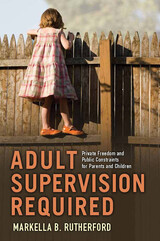
Adult Supervision Required considers the contradictory ways in which contemporary American culture has imagined individual autonomy for parents and children. In many ways, today’s parents and children have more freedom than ever before. There is widespread respect for children’s autonomy as distinct individuals, and a broad range of parenting styles are flourishing. Yet it may also be fair to say that there is an unprecedented fear of children’s and parents’ freedom. Dread about Amber Alerts and “stranger danger” have put an end to the unsupervised outdoor play enjoyed by earlier generations of suburban kids. Similarly, fear of bad parenting has not only given rise to a cottage industry of advice books for anxious parents, but has also granted state agencies greater power to police the family.
Using popular parenting advice literature as a springboard for a broader sociological analysis of the American family, Markella B. Rutherford explores how our increasingly psychological conception of the family might be jeopardizing our appreciation for parents’ and children’s public lives and civil liberties.
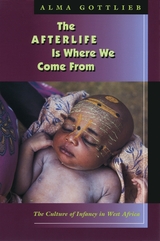
In this unique and engaging ethnography of babies, Alma Gottlieb explores how religious ideology affects every aspect of Beng childrearing practices—from bathing infants to protecting them from disease to teaching them how to crawl and walk—and how widespread poverty limits these practices. A mother of two, Gottlieb includes moving discussions of how her experiences among the Beng changed the way she saw her own parenting. Throughout the book she also draws telling comparisons between Beng and Euro-American parenting, bringing home just how deeply culture matters to the way we all rear our children.
All parents and anyone interested in the place of culture in the lives of infants, and vice versa, will enjoy The Afterlife Is Where We Come From.
"This wonderfully reflective text should provide the impetus for formulating research possibilities about infancy and toddlerhood for this century." — Caren J. Frost, Medical Anthropology Quarterly
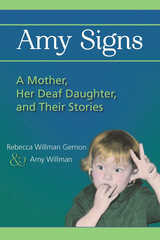
“Thirty-seven years ago, I vowed to write a truthful book about raising a deaf child.” Rebecca Willman Gernon followed through on her promise with her deaf daughter Amy Willman in this extraordinary new narrative. Many stories have been told about a parent’s struggle to help her deaf child succeed in a mostly hearing world. Amy Signs marks a signature departure in that both Rebecca and Amy relate their perspectives on their journey together.
When she learns of 11-month-old Amy’s deafness in 1969, Rebecca fully expresses her anguish, and traces all of the difficulties she endured in trying to find the right educational environment for Amy. The sacrifices of the rest of her family weighed heavily on her, also. Though she resolved to place four-year-old Amy in Nebraska’s residential school for deaf students, the emotional toll seemed too much to bear.
Amy’s view acts as the perfect counterpoint. Interwoven with her mother’s story, Amy’s account confirms that signing served her best. She summarizes life in boarding school as “laughter and homesickness.” She laughed with all of her deaf friends, though felt homesick at times. Amy thanks her mother for the gift of sign, asserting that a mainstream education would never have led her to earn a master’s degree and later teach American Sign Language at the University of Nebraska. Amy Signs is a positive albeit cautionary tale for parents of deaf children today whose only choice is a mainstreamed education.
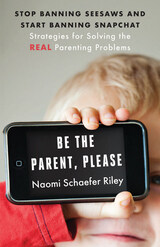
Silicon Valley tech giants design their products to hook even the most sophisticated adults. Imagine, then, the influence these devices have on the developing minds of young people. Touted as tools of the future that kids must master to ensure a job in the new economy, they are, in reality, the culprits, stealing our children’s attention, making them anxious, agitated, and depressed.
What’s worse, schools across the country are going digital under the assumption that a tablet with a wi-fi connection is what’s lacking in our education system. Add to that the legion of dangers invited by unregulated access to the internet, and it becomes clear that our screen-saturated culture is eroding some of the essential aspects of childhood.
In Be the Parent, Please, former New York Post and Wall Street Journal writer Naomi Schaefer Riley draws from her experience as a mother of three and delves into the latest research on the harmful effects that excessive technology usage has on a child’s intellectual, social, and moral formation. Throughout each chapter, she backs up her discussion with “tough mommy tips”—realistic advice for parents who want to take back control from tech.
With the alluring array of gadgets, apps, and utopian promises expanding by the day, engulfing more and more of our lives, Be the Parent, Please is both a wake-up call and an indispensable guide for parents who care about the healthy development of their children.
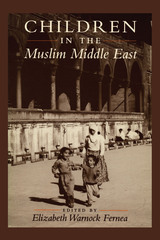
Today nearly half of all people in the Middle East are under the age of fifteen. Yet little is known about the new generation of boys and girls who are growing up in a world vastly different from that of their parents, a generation who will be the leaders of tomorrow. This groundbreaking anthology is an attempt to look at the current situation of children by presenting materials by both Middle Eastern and Western scholars. Many of the works have been translated from Arabic, Persian, and French.
The forty-one pieces are organized into sections on the history of childhood, growing up, health, work, education, politics and war, and play and the arts. They are presented in many forms: essays in history and social science, poems, proverbs, lullabies, games, and short stories. Countries represented are Egypt, Jordan, Morocco, Tunisia, Israel/West Bank, Kuwait, Saudi Arabia, Iran, Iraq, Syria, Sudan, Lebanon, Turkey, Yemen, and Afghanistan.
This book complements Elizabeth Fernea's earlier works, Women and the Family in the Middle East and Middle Eastern Muslim Women Speak (coedited with Basima Bezirgan). Like them, it will be important reading for everyone interested in the Middle East and in women's and children's issues.

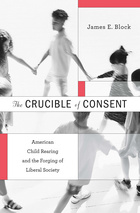
A democratic government requires the consent of its citizens. But how is that consent formed? Why should free people submit to any rule? Pursuing this question to its source for the first time, The Crucible of Consent argues that the explanation is to be found in the nursery and the schoolroom. Only in the receptive and less visible realms of childhood and youth could the necessary synthesis of self-direction and integrative social conduct—so contradictory in logic yet so functional in practice—be established without provoking reservation or resistance.
From the early postrevolutionary republic, two liberal child-rearing institutions—the family and schooling—took on a responsibility crucial to the growing nation: to produce the willing and seemingly self-initiated conformability on which the society’s claim of freedom and demand for order depended. Developing the institutional mechanisms for generating early consent required the constant transformation of child-rearing theory and practice over the course of the nineteenth century. By exploring the systematic reframing of relations between generations that resulted, this book offers new insight into the consenting citizenry at the foundation of liberal society, the novel domestic and educational structures that made it possible, and the unprecedented role created for the young in the modern world.

The Dadly Virtues is a tongue-in-cheek collection of encouragement and guidance for any stage of fatherhood, from pacifying babies to prepping for senior prom, from cutting the cord to getting the first, “Best Grandpa” t-shirt. P.J. O’Rourke sets the stage with the chapter, “What Do Men Get from Fatherhood? Besides What They Put In …” and then is followed by:
•Matthew Continetti’s, “Newborn Terror: The Moment You Realize that ‘Bundle of Joy’ Is a Euphemism for Something Very Different.”
•Stephen F. Hayes’ “Siblings: The Best Gift You’ll Ever Give Your Kids.”
•Jonah Goldberg’s “Get Your Kid a Dog: The Moral Case for Pets.”
•Tucker Carlson’s “In Praise of Adventure: How to Fill a Child’s Life with Excitement and Danger (without Getting Them Killed).”
•Michael Graham’s, “Dating: Enjoy the Movie and Please Keep the Impregnation to a Minimum.”
•Christopher Caldwell’s “College: It’s Not as Bad as You Think; It’s Worse.”
•Andrew Ferguson’s “Emerging Adults and Empty Nesters: Just When You Had Fatherhood All Figured Out.”
•Toby Young’s “The Dark Side: Bad Parenting and the Things We Think, but Do Not Say.”
•Joseph Epstein’s “Thanks, Grandpa: Grandfatherhood and the Spirit of the Age.”
•And more.
Father-to-be, two-time-dad, or granddad, each essay will make you laugh and, at the same time, reinforce your commitment to the virtuous—the dadly—life.
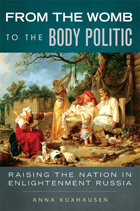
Making innovative use of obstetrical manuals, belles lettres, children’s primers, and other primary documents from the era, Anna Kuxhausen draws together many discourses—medical, pedagogical, and political—to show the scope and audacity of new notions about childrearing. Reformers aimed to teach women to care for the bodies of pregnant mothers, infants, and children according to medical standards of the Enlightenment. Kuxhausen reveals both their optimism and their sometimes fatal blind spots in matters of implementation. In examining the implication of women in public, even political, roles as agents of state-building and the civilizing process, From the Womb to the Body Politic offers a nuanced, expanded view of the Enlightenment in Russia and the ways in which Russians imagined their nation while constructing notions of childhood.
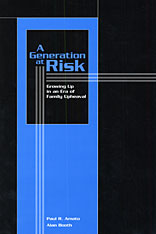
Just what do we know about the current generation of young Americans? So little it seems that we have dubbed them Generation X. Coming of age in the 1980s and '90s, they hail from families in flux, from an intimate landscape changing faster and more profoundly than ever before. This book is the first to give us a clear, close-up picture of these young Americans and to show how they have been affected and formed by the tremendous domestic changes of the last three decades.
How have members of this generation fared at school and at work, as they have moved into the world and formed families of their own? Do their struggles or successes reflect the turbulence of their time? These are the questions A Generation at Risk answers in comprehensive detail. Based on a unique fifteen-year study begun in 1980, the book considers parents' socioeconomic resources, their gender roles and relations, and the quality and stability of their marriages. It then examines children's relations with their parents, their intimate and broader social affiliations, and their psychological well-being. The authors provide rare insight into how both familial and historical contexts affect young people as they make the transition to adulthood.
Perhaps surprising is the authors' finding that, in this era of shifting gender roles, children who grow up in traditional father-breadwinner, mother-homemaker families and those in more egalitarian, role-sharing families apparently turn out the same. Also striking are the beneficial influence of parental education on children and the troubling long-term impact of marital conflict and divorce--an outcome that prompts the authors to suggest policy measures that encourage marital quality and stability.
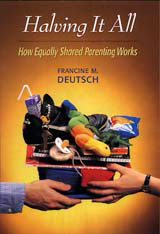
The best way to have it all--both a full family life and a career--is to halve it all. That's the message of Francine Deutsch's refreshing and humane book, based on extensive interviews with a wide range of couples. Deutsch casts a skeptical eye on the grim story of inequality that has been told since women found themselves working a second shift at home. She brings good news: equality based on shared parenting is possible, and it is emerging all around us. Some white-collar fathers achieve as well as talk about equality, and some blue-collar parents work alternate shifts to ensure that one parent can always be with the children.
Using vivid quotations from her interviews, Deutsch tells the story of couples who share parenting equally, and some who don't. The differences between the groups are not in politics, education, or class, but in the way they negotiate the large and small issues--from whose paid job is "important" to who applies the sunscreen. With the majority of mothers in the workforce, parents today have to find ways of sharing the work at home. Rigid ideas of "good mothers" and "good fathers," Deutsch argues, can be transformed into a more flexible reality: the good parent.
Halving It All takes the discussion beyond shrill ideological arguments about working mothers and absent fathers. Deutsch shows how, with the best of intentions, people perpetuate inequalities and injustices on the home front, but also, and more important, how they can devise more equal arrangements, out of explicit principles, or simply out of fairness and love.
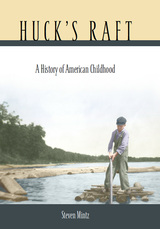
Like Huck’s raft, the experience of American childhood has been both adventurous and terrifying. For more than three centuries, adults have agonized over raising children while children have followed their own paths to development and expression. Now, Steven Mintz gives us the first comprehensive history of American childhood encompassing both the child’s and the adult’s tumultuous early years of life.
Underscoring diversity through time and across regions, Mintz traces the transformation of children from the sinful creatures perceived by Puritans to the productive workers of nineteenth-century farms and factories, from the cosseted cherubs of the Victorian era to the confident consumers of our own. He explores their role in revolutionary upheaval, westward expansion, industrial growth, wartime mobilization, and the modern welfare state. Revealing the harsh realities of children’s lives through history—the rigors of physical labor, the fear of chronic ailments, the heartbreak of premature death—he also acknowledges the freedom children once possessed to discover their world as well as themselves.
Whether at work or play, at home or school, the transition from childhood to adulthood has required generations of Americans to tackle tremendously difficult challenges. Today, adults impose ever-increasing demands on the young for self-discipline, cognitive development, and academic achievement, even as the influence of the mass media and consumer culture has grown. With a nod to the past, Mintz revisits an alternative to the goal-driven realities of contemporary childhood. An odyssey of psychological self-discovery and growth, this book suggests a vision of childhood that embraces risk and freedom—like the daring adventure on Huck’s raft.

In the past few years, a new breed of baby-watchers has discovered more about infancy than has ever been known before. Infants brings this knowledge out of inaccessible academic journals and makes it available to everyone in direct language.
Written by a child psychologist who has studied the developmental progress of infants for many years, the book describes and interprets the fascinating capabilities of infants in their first years of life. It covers the ability of the newborn to see and hear their parents, their natural disposition toward getting to know caregivers, and the growth of love and attachment between parent and baby. It explores the changing mental abilities and social skills in the first and second years, and tells readers how they can observe these stages in children.
At a time when parents are increasingly beset by contradictory advice about infant care, many will find it useful to have a sensible and caring book that presents the latest information on understanding the behavior of babies. Parenting can then become the emotionally fulfilling and intellectually stimulating responsibility it should be.
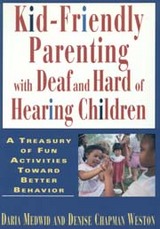
For the parents of thousands of deaf and hard of hearing children, this step-by-step guide offers hundreds of ideas and methods that work with children ages 3 to 12. It provides scores of play activities to help parents enhance communication, solve problems, and strengthen relationships in skillful, fun ways. Also, parenting techniques are concisely presented to help parents set limits while avoiding power struggles and help foster positive behavior changes. In addition, this manual provides information about special resources and support services.
At each chapter’s beginning, experts (some deaf, some hearing), including I. King Jordan, Jack Gannon, Merv Garretson, and others, offer their insights on the subject discussed. Designed for parents with various styles, Kid-Friendly Parenting is a complete, step-by-step guide and reference to raising a deaf or hard of hearing child.
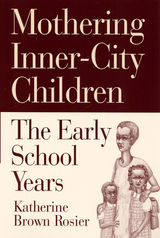
There are few groups more stereotyped and demonized than "welfare mothers," particularly low-income, African American women raising children in the inner city. But what are the day-to-day stories behind the stereotypes? How do African American mothers (both single women and those living with a partner) in poor families handle their roles as parents? What support networks do they rely on to help raise their children? How do their personal histories affect their parenting styles?
Sociologist Katherine Brown Rosier spent three years interviewing and observing Indianapolis mothers as their children made the transition from a Head Start program to kindergarten and through second grade, analyzing the families in their homes, schools, and other social settings. She brings forth the voices of the mothers, children, and their teachers, providing a multifaceted picture of how low-income African American families cope with the daily pressures and responsibilities of child rearing.
Rosier also examines how larger socio-economic factors influence these families' specific circumstances and histories. What child-rearing strategies do these mothers employ, she asks, to promote a smooth transition into school despite complex discontinuities among their homes, schools, and communities? How are these strategies viewed and supported or impeded by teachers, family, friends, and neighbors?
Until now, most research on poor African American families has focused so intently on the problems confronted by this seemingly homogenous group that the routine practices of every day life have been ignored. In this unique project, Rosier allows the families' individual experiences and thoughts to contribute to and complicate current research.
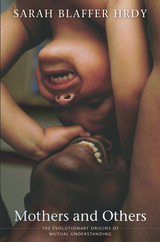
Somewhere in Africa, more than a million years ago, a line of apes began to rear their young differently than their Great Ape ancestors. From this new form of care came new ways of engaging and understanding each other. How such singular human capacities evolved, and how they have kept us alive for thousands of generations, is the mystery revealed in this bold and wide-ranging new vision of human emotional evolution.
Mothers and Others finds the key in the primatologically unique length of human childhood. If the young were to survive in a world of scarce food, they needed to be cared for, not only by their mothers but also by siblings, aunts, fathers, friends—and, with any luck, grandmothers. Out of this complicated and contingent form of childrearing, Sarah Hrdy argues, came the human capacity for understanding others. Mothers and others teach us who will care, and who will not.
From its opening vision of “apes on a plane”; to descriptions of baby care among marmosets, chimpanzees, wolves, and lions; to explanations about why men in hunter-gatherer societies hunt together, Mothers and Others is compellingly readable. But it is also an intricately knit argument that ever since the Pleistocene, it has taken a village to raise children—and how that gave our ancient ancestors the first push on the path toward becoming emotionally modern human beings.
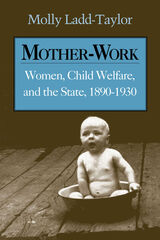
Early in the twentieth century, maternal and child welfare evolved from a private family responsibility into a matter of national policy. Molly Ladd-Taylor explores both the private and public aspects of child-rearing, using the relationship between them to cast new light on the histories of motherhood, the welfare state, and women's activism in the United States.
Ladd-Taylor argues that mother-work, "women's unpaid work of reproduction and caregiving," motivated women's public activism and "maternalist" ideology. Mothering experiences led women to become active in the development of public health, education, and welfare services. In turn, the advent of these services altered mothering in many ways, including the reduction of the infant mortality rate.
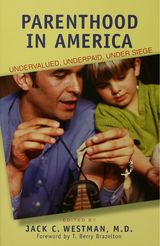
Parenthood in America brings the insights of experts in child development, education, health, media studies, economics, history, sociology, and human services to bear on practical aspects of childrearing and on the kinds of policies that have a real effect on parenting. In response to the stresses of parenthood today, they call for:
o family-friendly workplaces and decent childcare options
o pediatric health care for all
o programs that aid children’s development as well as their physical health
o recognition by professionals of parents’ expert knowledge about their own children
o alternatives to vapid or violent games and TV programs
o prioritization of time for family meals, talks, chores, and activities
o valuing of caring relationships above wealth and possessions
o appreciation of cultural and religious diversity
o supportive networks among parents, teachers, pediatricians, and childcare providers.
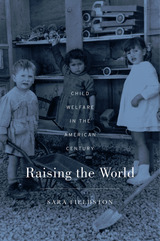
After World War II, American organizations launched efforts to improve the lives of foreign children, from war orphans in Europe and Japan to impoverished youth in the developing world. Providing material aid, education, and emotional support, these programs had a deep humanitarian underpinning. But they were also political projects. Sara Fieldston’s comprehensive account Raising the World shows that the influence of child welfare agencies around the globe contributed to the United States’ expanding hegemony. These organizations filtered American power through the prism of familial love and shaped perceptions of the United States as the benevolent parent in a family of nations.
The American Friends Service Committee, Foster Parents’ Plan, and Christian Children’s Fund, among others, sent experts abroad to build nursery schools and orphanages and to instruct parents in modern theories of child rearing and personality development. Back home, thousands of others “sponsored” overseas children by sending money and exchanging often-intimate letters. Although driven by sincere impulses and sometimes fostering durable friendships, such efforts doubled as a form of social engineering. Americans believed that child rearing could prevent the rise of future dictators, curb the appeal of communism, and facilitate economic development around the world.
By the 1970s, child welfare agencies had to adjust to a new world in which American power was increasingly suspect. But even as volunteers reconsidered the project of reshaping foreign societies, a perceived universality of children’s needs continued to justify intervention by Americans into young lives across the globe.
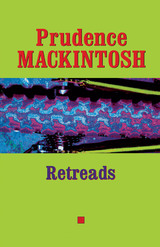
Retreads tells the middle of the story begun in Thundering Sneakers and concluded in Sneaking Out. In this collection of essays, Prudence Mackintosh follows her sons through the "tween" years between little boyhood and adolescence. Vividly portraying the chaos that descends on a house full of active children, she also records the many first times and last times that give poignancy to the middle years of motherhood.

When this book was first published in 1909, Addams was the most famous woman in America. A celebrity and a spiritual leader, she was widely regarded as practical, realistic, and endowed with a special insight into the problems of urban America. The Spirit of Youth and the City Streets--her favorite of her own books--establishes Addams as an accomplished writer as well as a reformer. In this compact volume she examines the causes for the discontent of youth in the city, chiding educators for their "persistent blindness to youth's most obvious needs."
Addams argues for the importance of providing direction and focus--for example, through public recreation, practical education, and experiences in the arts--for the pent-up energies of young men and women. She takes a realistic view of their basic social and sexual drives and their disaffection and alienation in an industrial world. At the same time, she rejects the hereditary explanations for delinquency that prevailed in her day. Allen F. Davis's introduction provides a biographical profile of Addams and a commentary on her importance as a writer and a social activist.
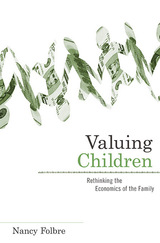
Nancy Folbre challenges the conventional economist's assumption that parents have children for the same reason that they acquire pets--primarily for the pleasure of their company. Children become the workers and taxpayers of the next generation, and "investments" in them offer a significant payback to other participants in the economy.
Yet parents, especially mothers, pay most of the costs. The high price of childrearing pushes many families into poverty, often with adverse consequences for children themselves.
Parents spend time as well as money on children. Yet most estimates of the "cost" of children ignore the value of this time. Folbre provides a startlingly high but entirely credible estimate of the value of parental time per child by asking what it would cost to purchase a comparable substitute for it.
She also emphasizes the need for better accounting of public expenditure on children over the life cycle and describes the need to rethink the very structure and logic of the welfare state. A new institutional structure could promote more cooperative, sustainable, and efficient commitments to the next generation.
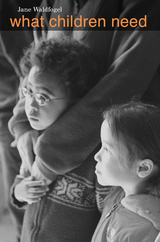
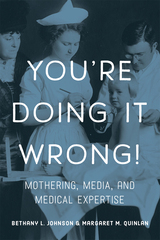
You’re Doing it Wrong! investigates the storied history of mothering advice in the media, from the newspapers, magazines, doctors’ records and personal papers of the nineteenth-century to today’s websites, Facebook groups, and Instagram feeds. Johnson and Quinlan find surprising parallels between today’s mothering experts and their Victorian counterparts, but they also explore how social media has placed unprecedented pressures on new mothers, even while it may function as social support for some. They further examine the contentious construction of prenatal and baby care expertise itself, as individuals such as everyone from medical professionals to experienced moms have competed to have their expertise acknowledged in the public sphere.
Exploring potential health crises from infertility treatments to “better babies” milestones, You’re Doing it Wrong! provides a provocative look at historical and contemporary medical expertise during conception, pregnancy, childbirth, postpartum, and infant care stages.
READERS
Browse our collection.
PUBLISHERS
See BiblioVault's publisher services.
STUDENT SERVICES
Files for college accessibility offices.
UChicago Accessibility Resources
home | accessibility | search | about | contact us
BiblioVault ® 2001 - 2024
The University of Chicago Press









